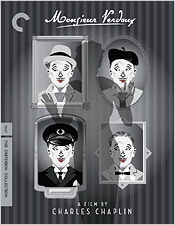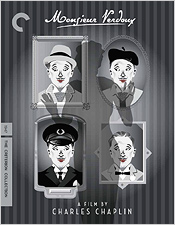Monsieur Verdoux (Blu-ray Review)

Director
Charlie ChaplinRelease Date(s)
1947 (March 26, 2013)Studio(s)
Janus Films (Criterion - Spine #652)- Film/Program Grade: A+
- Video Grade: A
- Audio Grade: A
- Extras Grade: A+
Review
Monsieur Verdoux was, for better or worse, Charlie Chaplin’s first major flop, at least in the United States. The reason for this wasn’t due to the quality of the film itself being forsaken on Chaplin’s part, but the political upheaval and scandal surrounding him at the time. It has grown in estimation since then, but in those days it was seen by many as an unwelcome slice of both political and personal subversion.
During the 1930’s and 1940’s, Charlie Chaplin was one of the most publicized and scrutinized celebrities in all of Hollywood. His tabloid exploits were a thing of legend, and while many of them weren’t true (at least by his own admission), they seemed to paint a portrait of the man behind “The Tramp.” As with all celebrities of his stature, the good will and favoritism of the public didn’t last forever. It wasn’t until he started making more serious and politically-driven comedy films, like The Great Dictator, that both the press and the public began to take a genuine interest in his personal beliefs and political stance. He was quite often labeled as a communist, especially when he supported friends of his who were brought before the House Un-American Activities Committee. During a trip to London, his passport was revoked and he was no longer welcome in the United States ever again. He continued to make films outside of Hollywood, but his star had essentially fallen. Both his stature as one of the world’s most endearing icons and his status as one of Hollywood’s most enduring filmmakers was toppled.
Those weren’t the only things that factored into the failure of Monsieur Verdoux, but they played a major role. The film was also a dramatic change for Charlie Chaplin. He dropped the Tramp character forever and decided to make a dark comedy, the likes of which he had never taken part in before. The idea itself was one by Orson Welles, who had the idea to make a film with Charlie Chaplin. When the two couldn’t reach an agreement on the story material, Welles signed over the idea to Chaplin, who would go on to shape the material to his own liking. The result was a spectacularly bleak farce about money and murder. The film was also about the stock market crash and the lengths that a man would go to to support his family. It challenged viewers with moral dilemmas, with equal parts black AND white. Looking at the film today, there are some very nice touches in there that make the character of Henri Verdoux more likeable early on that perhaps weren’t noticed much initially. Like the fact that Verdoux makes a point to not step on a caterpillar, even helping it on its way. Or when a potential victim of his becomes the receiver of his kindness when he finds them to be a good-hearted person. On the other hand, we never actually see him kill anyone. It’s left up to the imagination, and I find that far more chilling than actually showing the act. The idea of it, and the deconstruction of Charlie Chaplin’s lovable persona, surely doomed the film from the start. To say that the film is challenging for an audience would be an understatement, and it shouldn’t come as a surprise that the film died a horrible death upon release, but unfortunately, it did.
Long gone were the days of the funny little man going on a hunt for gold in the middle of winter, or adopting a small dog and taking care of it. Nor were we ever to again see a goofy factory worker on an assembly line who falls into the machinery for visual gags. Nearly all of the gags were gone and all of the bets were off. The sweet and charming side of Chaplin seemed to be gone for good. Now, with this film, we have a man with questionable morals bumping off widows for their money one by one. He does it for his wife and child, of course, but you also get the sense that he takes a bit of pleasure in it too. Not that he celebrates it or holds it in high regard, but he never seems phased by the act. It’s just, as he says in the film, “business.” For all of these reasons and more, Monsieur Verdoux bombed and eventually became a cult film. It also became a bit of a curiosity among Chaplin fans, as well as fans of filmmaking in general. Debate surrounds the film and pervades its very atmosphere, but when all is said and done, it’s still a fantastic film. It constantly delivers the dark comedy, but it also delivers in both philosophy and moral ambiguity, not unlike some of his previous work. Even the film’s ad campaign was built around the tagline “Chaplin changes! Can you?” Unfortunately, no one could.
Criterion’s lovely new blu-ray release of the film sports a wonderful transfer from a recent 2K restoration from the original 35mm camera negative. The results are quite splendid. For a film its age, it shows a remarkable amount of life and vitality in the image. Evenly distributed grain overlays the frame and holds an amazing amount of clarity in the image. The contrast and brightness of the images are just perfect, and all of the blacks, whites and grays are quite strong. Some may find the vertical lines and the weaker portions of the frame that have been left behind in the restoration process eyesores, but I found it very easy to dismiss them. They stay mainly along the left and right edges of the frame and never interfere with the main presentation, which I suspect is why this film element was chosen. Besides, the film is strong enough for one to be caught up in it and forget about these minor image flaws. Overall, it’s an extremely beautiful-looking presentation. The film’s soundtrack, which is the original English uncompressed mono track, is very worthy, as well. It obviously shows its age, like many of Charlie Chaplin’s films do, but I found it to be quite clear and affecting. It’s all laid out very well. Dialogue is crystal clear, Charlie Chaplin’s wonderful score is very robust, and sound effects, though mostly old-fashioned sounding in nature, are very clear. It all comes together quite well. There are also subtitles in English for those who might need them.
I want to also commend Criterion on the main menu design, which reflects the film’s tone quite well. It reminded me of the Blu-ray menus from Disney’s animated films, which seems odd for comparison, I know, but there it is. The supplemental material within these menus is a nice little treasure trove to dig though. There’s the 2003 documentary Chaplin Today: “Monsieur Verdoux” featuring filmmaker Claude Chabrol and actor Norman Lloyd; the Charlie Chaplin and the American Press documentary featuring the director of the Chaplin company Roy Export, Kate Guyonvarch and author Charles Maland; an illustrated audio interview with actor Marilyn Nash; several radio advertisements and theatrical trailers; and finally, a 36-page booklet with an essay by critic Ignatiy Vishnevetsky and reprinted pieces by both Chaplin and critic André Bazin.
I suppose one would be in the minority in declaring Monsieur Verdoux as their favorite Charlie Chaplin film. While it isn’t mine personally (mine’s The Gold Rush, if you want to know), I can certainly see why aficionados would come to that conclusion. It’s a well-crafted film and totally unlike anything Chaplin did before or after. I think it deserves to be in the limelight. It’s just a shame that Charlie Chaplin isn’t here to share in its revival with us. Needless to say, this is another highly-recommended addition to your Blu-ray collection.
- Tim Salmons

